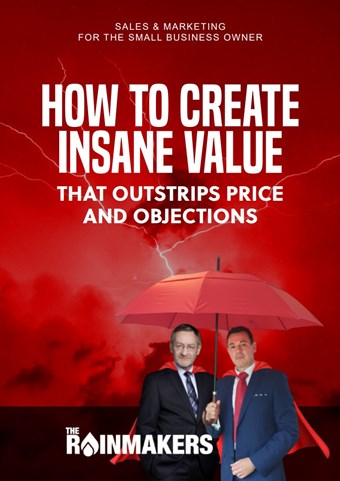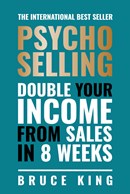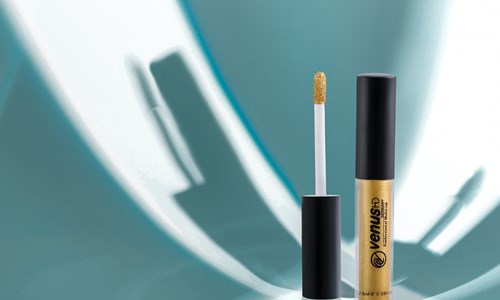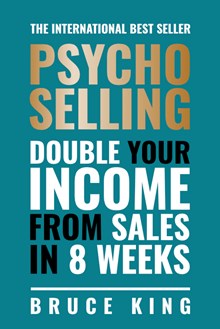DOUBLE YOUR INCOME IN JUST 8 WEEKS
Download this all-time classic bestselling book from Bruce King free.


Button up. Optimise your CTA text
By Chris Haycock | 12 November 2015
How I increased clickthrough rates on a single button by optimising the text, and nothing else.
In this article I'm going to describe how I managed to increase sales on one of my websites massively, simply by changing the words on a single button. To provide a bit of context, I'll tell you the story behind it.
Ten years ago, when the only consideration when designing websites was 'how great it looked', I stumbled across a blog post by Bryan Eisenberg, who (along with his brother Jeffrey) were championing a revolutionary new methodology called 'Persuasion Architecture'. It changed my life forever, and has been responsible for helping my company's profits grow substantially. Unfortunately, that original blog post is no longer to be found on the web, but I'll never forget the impact it had on me. Being someone with more than a passing interest in psychology, it piqued my curiosity, and I just HAD to find out more about it. Here was a framework of recommendations and actions that website owners could put into practice on their website that could potentially boost the number of user 'conversions', whether that's buy a product, fill in a form, download a white paper, click on an banner ad, or even just read an article. The fundamentals of 'persuading' your users to take the desired action seems simple: understand your users and take action. Find out who they are and what motivates them. Use this knowledge to map their journey as they use your website, placing strong calls-to-action in strategic places, addressing their concerns and 'pain points', and use language that resonates with them.Pandoras Box had opened
"Sounds fairly simple", I thought. However, the journey of enlightenment took six months. There was so much to learn. Every stone I turned over revealed more stones, and underneath every stone there was a nugget of gold. The more I learned about this powerful new methodology, the more thirsty I became for knowledge of Persuasion Architecture. It felt like I had opened Pandoras Box, and I wanted more and more. Luckily, my job was Online Marketing Manager at an price comparison dot com up in Liverpool at the time, and the MD was more than happy for me to quench my thirst for this exciting new concept, given that it could potentially mean more customers. More customers = more profit, so it was a win-win situation for both of us.Words. They're so powerful.
One of the many areas of Persuasion Architecture involves looking at how the wording on website buttons can be changed subtly to increase the percentage of clicks. Get the wording just right, using more powerful and persuasive words and watch as the conversion rate rises dramatically. It sounded too good to be true. Yet, time and time again by optimising the button text I would consistently see conversions increase, sometimes with the tiniest of changes to the text. At the price comparison company, we saw an overall increase in customers of almost 500% by implementing these subtle changes, although I should add that there were other techniques that I also implemented on the website.My God, it worked!
I was hooked! Fast forward ten years to today and this method still astounds me. When putting together a website it's so easy to overlook the humble button, and just label them with 'Click Here', or 'Submit', 'Buy' or 'Contact Us'. Sure, these buttons will get sales/conversions, but you're really not making the most of their potential. There is an opportunity to increase your conversion rate quite dramatically by understanding the motivations of your users, manage their expectations, add value and motivate them into that all-important "CLICK"- all in just a handful of words and a little knowledge of your target market. Let's say, for example, that you get 1,000 people to your landing page each week. You've got a wonderfully prominent call-to-action button labelled 'Buy Now' that currently converts 10 visitors into customers, and it's placed directly in the path of your potential new customer. Brilliant, you might say. Now we're in business. Sure, that's a start - a 1% conversion rate. Now, what would happen if you could convert 4% instead of 1% by changing the text on your call-to-action button? Sounds like a negligible, and relatively easy increase, right? If you agree, then you're right. But also, let this sink in: by increasing your conversions from 1% to 4%, you're QUADRUPLING your customers, revenue and profits. No huge marketing spend, no big fancy advertising campaign and very, very little effort involved, apart from ten minutes of your precious time, and a knowledge of your most prized possession - your target market.10 mins work = dramatic results
Very recently I undertook my own test experiment. Anyone that knows me will tell you that I harp on about testing, testing, testing. I'm a massive advocate of split testing - because it works. One of the websites in my portfolio contains pages showing local hotels. I act as an affiliate for a couple of major hotel websites, so I get commission whenever someone books a hotel room through my website. It's passive income and it has done very well since I integrated the hotel booking facility within the website. Anyway, by adding the hotels to my website earlier on in 2015 I was generating on average around £25,000 in room sales per month. Not bad, but as I said I'm an advocate of split testing, and I wanted to know if I could increase that further by optimising my button text. My original call-to-action button was 'Details & Availability' as we can see below, which was fine(ish). It was better than 'Click Here', anyway. Ten days ago I changed the button slightly to the below version. I elaborated a little more to show the user extra information (managing expectation), as well as adding a calendar icon (creating a obvious connection). This, I felt, would entice more people to click on the button as it seemed like a natural progression that would answer the user's next question once they have found a hotel they liked: "Is it available on the dates I require?". Here are the two buttons (the original and the new) side-by-side. Ten minutes deep in thought is all it took to rethink the button.Original Button |
New Button |
Wait a minute...
First, a massive disclaimer. Ten days results are NOT conclusive, they are barely indicative. In fact, ten days is nothing, even if I AM analysing data from thousands of visitors. In order to perform definitive tests you need to understand your market, as well as identify other factors that may be at play here. And you need to analyse results from a much longer timeframe. Please bear that in mind. But...OK, so how do you optimise your button text?
I'm assuming that you've already optimised the button colour, placement and font sizes already (you HAVE done split tests for these, haven't you?). If you want to give button text optimisation a go, which I thoroughly recommend, then follow these basic guidelines. What have you got to lose?- Manage expectations
Don't be vague. Tell the user what to expect once they have clicked on the button. If you want to elaborate then do so using text directly underneath the button. Explain your process and empower your users so they're not left guessing what to expect from clicking that button. - Test two versions
A longer text (as in my own example), and another very short version that can be read in under a second. You never know which one will attract more clicks. I've been optimising buttons for years, but my intuition can still never be trusted completely. - Use words to convey an action
Start the button text with a snappy verb such as "Try", "Get", "Reserve" etc. One exception - don't use "Submit". It sounds too 'submissive', and won't do your conversion rates any favours. - Convey immediacy where possible
By changing my button to include "Show", it hints that the user will see immediate answers to what they're looking for. Alternatively, use the word "Now", "Today", "Limited Time" etc., for that real 'fear-of-loss' factor. - Use positive words where possible
Think about words you can use that suggest how your user will benefit from taking action. Read up on Maslow's Hierarchy of Needs and incorporate some of the words that you'll learn that REALLY motivate potential customers. - Include the word "You", "Discover" or "Free"
...at least where possible. They are very powerful words. If you can't incorporate them within the button text, place them prominently around the button where they're unlikely to be missed. - Think value
Make your wording consistent to the value proposition that you've used in your copy, and reinforce it on your button text.
Challenge the status quo
So, what next for me? Well, I never rest on my laurels. Once I have more substantial analytics I'll probably tweak the text further. Don't ever assume that you can't increase clickthroughs any further, because inevitably you'll find something else that works even better. Test, test, test. That's all you need to know.Last-minute tip
Don't risk it all. Remember, if you're not confident, perform the split test on a low percentage of your users (perhaps as little as 10%), so that you're not jeopardising your sales. Good luck, and let me know how you get on. Chris---

There's more inside The Rainmakers Club
Ready to double, triple or even quadruple your sales? Join the Rainmakers Club today and get access to hundreds more worksheets, ebooks, tutorials, guides, tools and downloads.
NEW FOR 2022! Join our growing club of successful small business owners and get The Raindeck free: a 3-deck strategy for brainstorming and running successful marketing campaigns.

HOW TO CREATE INSANE VALUE
A must-have read for anyone that sells anything
Discover techniques and methods that will increase your product's perceived value - without having to change your product or prices.
Get the book freeGET STARTED WITH
The Rainmakers
Join today for the price of your daily cup of Mocha coffee, and become a sales and marketing giant.
Learn sales & marketing
Double, triple, or quadruple your sales and income.
Expert mentoring
Learn from renowned sales and marketing experts.
Exclusive resource library
Tools, downloads, cheat sheets and worksheets to help you succeed.
Free Raindeck strategy box
Brainstorm, plan and execute brilliant marketing campaigns in no time.

















